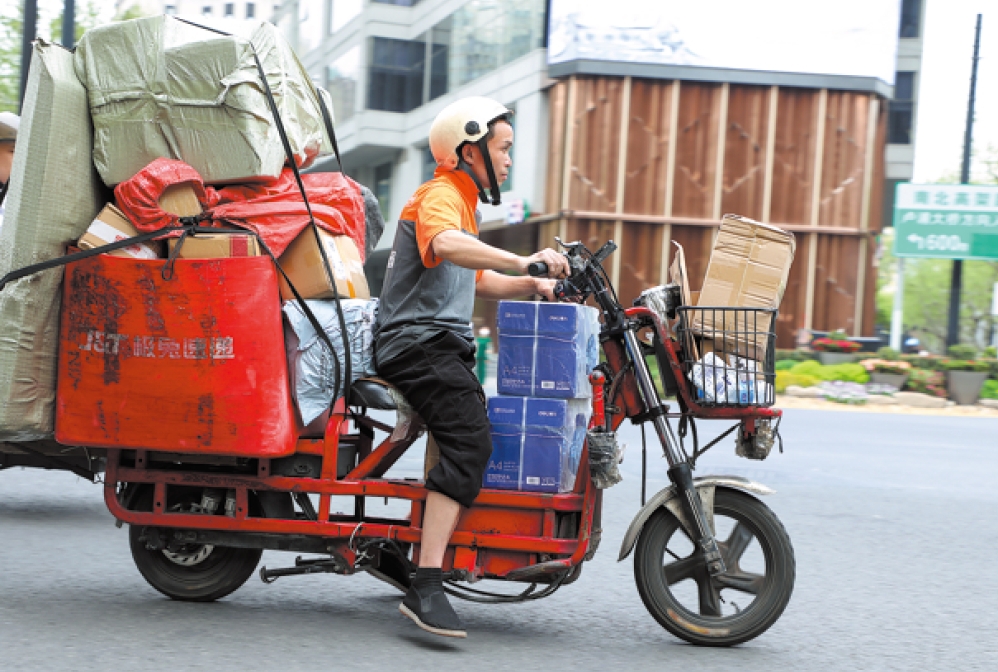
Major on-demand service platforms in China have been taking gradual steps to provide social insurance coverage for delivery workers.
JD, a Chinese e-commerce platform that launched its takeout delivery service in February, now provides social insurance for its more than 10,000 full-time delivery workers in the sector.
"The platform offers social insurance to me," said Wang Chenguo, a JD full-time takeout delivery worker in Beijing who joined the platform a month ago. "I was informed of the social insurance policy when I signed the contract with JD, and I felt good about that."
On April 3, Meituan, one of China's leading on-demand service platforms, launched pilot pension insurance programs for its delivery workers in Quanzhou, Fujian province, and Nantong, Jiangsu province. The initiative covers approximately 22,000 eligible delivery riders in those regions.

Different programs
Delivery workers often have flexible working schedules and locations, as well as varied employment relationships. Some have exclusive and long-term employment relations with platforms, while others work part-time across multiple platforms.
These characteristics have made it difficult for companies to include delivery workers under the current social insurance framework.
Last year, China had around 15 million delivery workers, a 15.38 percent increase from the previous year, according to the blue-collar employment survey report by the research center of new forms of employment.
To protect laborers, China's social insurance system includes five major components: pension, as well as medical, unemployment, occupational injury and maternity insurances. Premiums are usually shared between employers and employees.
At the end of February, JD announced that it would begin covering full social insurance plus a housing provident fund for all full-time takeout delivery workers starting March 1, becoming the first platform to take this step. The company has also been providing similar coverage for its express delivery personnel.
According to JD, the platform covers the full cost of social insurance premiums to ensure that delivery workers' take-home income remains unaffected. The policy applies to both current and new employees with formal contracts.
As of March, JD employed around 10,000 full-time takeout delivery workers. The company also announced that it would provide accident and health insurance for its part-time couriers.
On April 15, JD announced that it would employ at least 50,000 full-time takeout delivery workers during this quarter and promised to provide them with full social insurance and housing provident fund.
Meanwhile, Meituan, which has over 820,000 active delivery workers, has adopted a different approach to fulfill its promise. It launched pilot pension programs in two cities.
READ MORE: Chinese authorities tackle algorithmic exploitation of delivery workers
These pilots are based on the national social insurance policy for flexible workers. Under the program, delivery workers whose monthly income meets the local minimum contribution base and who have met this threshold for at least three out of the past six months can receive a 50 percent subsidy from Meituan toward their pension premiums. Riders can also choose to contribute in their city of employment or their hometown.
In Quanzhou, one of the pilot cities, the pension contribution base for flexible workers is set at 4,433 yuan ($608) per month. Since pension premiums account for 20 percent of income, the total contribution for workers whose income is at this level will be 886.6 yuan. Under Meituan's new policy, the rider pays 443.3 yuan, and the company pays the other half.
"The program has no qualification requirements, no location restrictions, no minimum working hours or order delivery volume, and no limitations on delivery type," Meituan announced on its official WeChat account.
As long as workers meet the national standards for flexible employment insurance, they are eligible to participate in the pension program, and there is no need to sign any commitment or contract, according to Meituan. Riders who voluntarily pay the premium in a given month will automatically qualify for the platform's subsidy.

Sense of security
Li, a 41-year-old Meituan delivery rider who asked to be identified by his surname, has been delivering for six years in Beijing. "We have traffic accident insurance, but so far I have not heard about the social insurance policy," he said.
Even though the pension premium would be subtracted from his salary, Li said that having social insurance would give him a sense of security.
Feng Yi, director of the research institute under Zheshang Asset Management Co, remarked, "Reform doesn't happen overnight, but JD's decision to provide social insurance for its delivery workers has helped drive industrywide change."
"As temporary workers in the delivery industry are transitioned into formal employees, they gain more motivation to improve service quality," Feng said. "This transformation encourages the industry to shift its focus from cost and speed to quality and service."
This shift in the delivery sector is also expected to accelerate the platform economy's move toward more standardized and people-centered development, according to Feng.
Cheng Kai, a delivery rider with eight years of delivery experience in Beijing, works for multiple platforms, including JD and Eleme, another major player in the on-demand service industry.
ALSO READ: Labor data: Nearly 13,000 employed by delivery platforms in HK
"While working for multiple platforms means a lack of stable social insurance from one employer, it is more flexible and enables me to access more orders," Cheng said.
A 46-year-old part-time delivery rider surnamed Dang who has been working with Dada, a delivery platform partnering with JD, for over a year, said that his social insurance is covered by another company he works for. "I am willing to shift my social insurance contribution to the delivery company and quit the other job if it offers the policy because delivery work is more flexible."

Challenges, benefits
According to a survey conducted by the National School of Development at Peking University, which gathered responses from over 30,000 delivery workers, only 10 percent accept the current proportion of social insurance relative to their income.
The survey revealed that if delivery riders are obligated to contribute to social insurance, 23.5 percent were not willing to pay, and 38.9 percent were only willing to contribute less than 5 percent of their monthly income.
Delivery riders tend to prioritize cash flows, with social insurance ranking behind income and job flexibility in terms of importance.
Last year, the average monthly income of delivery workers in China reached 7,469 yuan, placing them among the top tier of blue-collar occupations, alongside truck drivers and housekeepers, according to the blue-collar employment survey report.
Zhang Chenggang, director of the research center of new forms on employment, said, "On one hand, without social insurance, delivery workers lack essential support after retirement."
"On the other hand, making social insurance mandatory would increase labor costs for on-demand service platforms by around 40 percent. This could lead to reduced business operations and job opportunities, or lower wages for delivery workers."
Covering premiums of social insurance for Meituan's over 820,000 delivery riders would cause labor costs to increase by nearly 10 billion yuan, equivalent to 70 to 80 percent of the company's profit, according to Zhang.
While delivery riders with prior experience in other jobs understand the importance of social insurance, many younger riders remain unaware of its benefits.
READ MORE: Women riding high in delivery industry
Zhang Xingxing, who turned 18 last year, became a delivery rider for Meituan in March. "I saw the news that Meituan is covering pensions for riders. Although I don't know much about the different types of social insurance, I think it's important to plan for the future."
Zhang and his peers, mostly aged between 18 and 21, are among the youngest workers in the delivery area in Beijing. Many of them said they knew little about social insurance.
Voluntary contributions to social insurance based on the flexible employment system may not be able to motivate workers to participate and stabilize the labor force if delivery workers have low expectations for long-term benefits and a low willingness to participate, according to Zhang Chenggang.

"JD's model emphasizes comprehensive social insurance coverage under full-time employment relationships, indirectly channeling part of the value created by the platform back to front-line workers through social insurance," Zhang explained. "Meituan's model focuses more on flexibility, gradually improving workers' welfare levels while maintaining the employment scale."
"Regardless of which model is adopted," Zhang concluded, "both will reshape the income distribution landscape within the platform economy."
The new forms of employment refer to flexible work arrangements that rely on digital technologies such as the internet and artificial intelligence. These jobs are often carried out in a decentralized way through platforms.
The new forms include delivery workers, livestreamers and housekeepers. According to estimates, the scale of new forms of employment in China has reached 84 million people, with an estimated 3 to 5 percent annual growth rate, the report said.
However, flexible working conditions come with trade-offs, including high risk on roads, lack of holidays and long on-call hours for delivery workers.
Many in the gig economy also face ambiguous labor relationships, which often leave them without access to social insurance.
In recent years, China has stepped up efforts to protect the rights of laborers in new forms of employment from different aspects.

Changing job patterns
In November 2024, the National Trade Union and four other departments issued guidelines to regulate the negotiations between platforms and laborers in new forms of employment, covering key issues such as remuneration methods, work breaks and workplace safety.
In January, the Society Work Department of the CPC Central Committee, along with eight other departments, released documents aimed at improving services and management for delivery and express workers. Proposed measures include creating delivery-friendly environments in residential communities, shopping malls and office buildings.
Zhang, the 18-year-old deliveryman, said: "Many restaurants offer discounted meals for us. We can get the meal as we are in delivery uniforms."
"However, some office buildings and residential areas still do not allow us to enter," he added.
The 2025 Government Work Report noted that the Chinese government will strengthen the protection of the rights and interests of workers in new forms of employment and expand the pilot programs for occupational injury insurance.
Wang Xiaoping, minister of human resources and social security, said that by the end of 2024, the national basic pension insurance covered 1.07 billion people.
While China has one of the world's largest social insurance systems, there is still a large gap to cover the entire labor force in the country, especially the large-scale flexible workforce. Both the government and companies are trying to address the issue.
The system will adjust to the changes in employment forms by exploring and improving contribution methods, so that more individuals in new forms of employment can be incorporated into the employee social insurance system and enjoy a higher level of protection, according to Wang.
Zhang Chenggang emphasized that the key is to design a sustainable social security system tailored to China's national conditions, one that protects the laborers' rights without hindering employment. He stressed that the system should ensure a fairer and more reasonable income distribution.
"The ultimate goal is for everyone participating in economic activities to receive returns commensurate with their contributions, enjoy the opportunity for dignified labor and a respectful retirement, and truly realize the development philosophy where the fruits of development are shared by all," said Zhang.
Feng regarded this move of platforms providing social insurance for delivery workers as a transformation that aligns laborers' rights more closely with enterprise development.
"As millions of people working in flexible forms gradually become included in the social security system, the overall welfare of workers will improve," Feng said.
Contact the writer at lishangyi@chinadaily.com.cn


